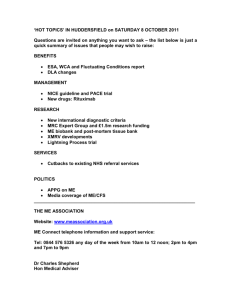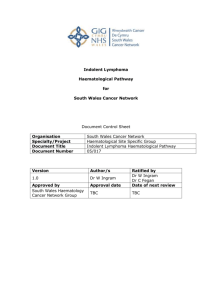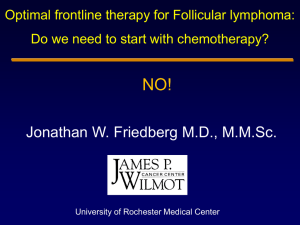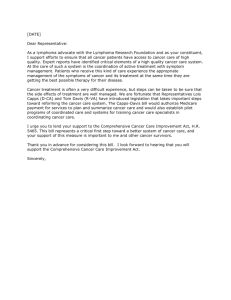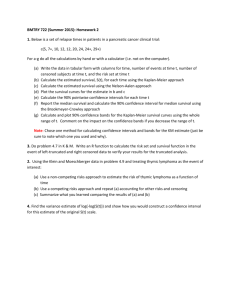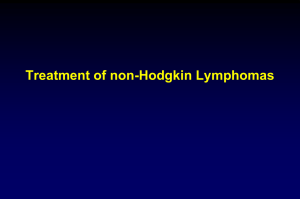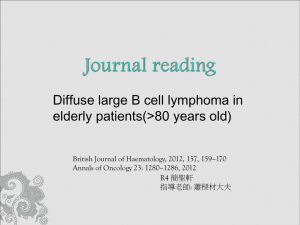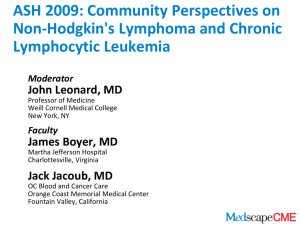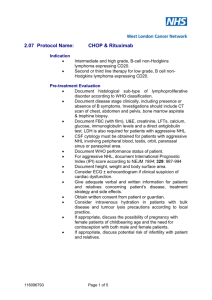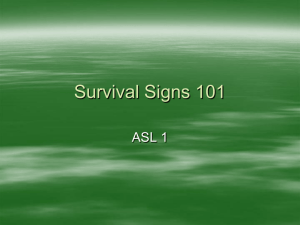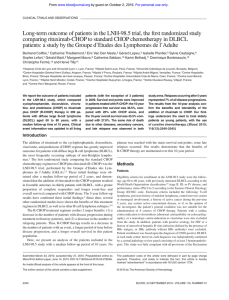Bendamustine-Rituximab
advertisement
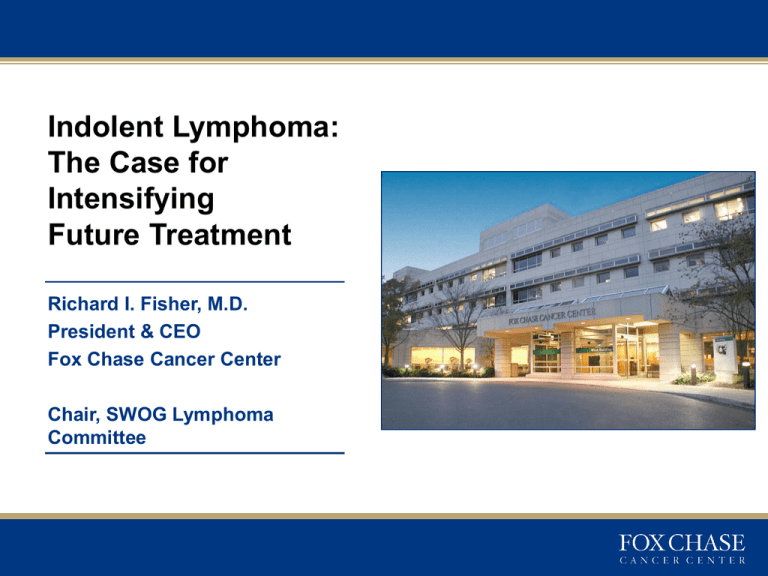
Indolent Lymphoma: The Case for Intensifying Future Treatment Richard I. Fisher, M.D. President & CEO Fox Chase Cancer Center Chair, SWOG Lymphoma Committee Multiple Treatment Options Exist for Indolent NHL Watchful waiting Chemotherapy – Single agent – Combination Monoclonal antibody therapy Radioimmunotherapy (RIT)* Stem cell transplantation External beam radiation – Rituximab *Investigational Vose. Ann Oncol. 1996;7(suppl 6)S13–S19; Horning. Semin Oncol. 1993;20(suppl 5):75–88. Follicular Lymphoma: 1970 – 1990’s Conclusions from Past Trials Overall Survival (OS) was not impacted by treatment with alkylating agents, anthracyclines, or combination chemotherapy Median OS for all patients = 7 – 10 years Less than 20% of patients were alive at 20 years “Watch and wait” therapy did not reduce OS IMPROVED OS WAS NOT A REASONABLE ENDPOINT FOR CLINICAL TRIALS!!! The Natural History of Indolent NHL Remains Unchanged Survival (N = 1021), 1960–1991 100 1960–1975 1976–1986 1987–1991 80 Actuarial survival (%) 60 40 20 0 0 6 12 18 Years Horning. Semin Oncol. 1993;20(suppl 5):75–88. 24 30 36 1990’s WHAT CHANGED?? RITUXIMAB R-CVP vs. CVP in Untreated Stage III/IV FL 322 untreated patients: 49% FLIPI poor risk, 41% intermediate Rituximab Repeat cycle 375 mg/m2 (8 cycles total) R Cyclophosphamide A 750 mg/m2 N Vincristine D O M I Z 1.4 mg/m2 1 2 3 4 5 6 7 14 Days 21 Prednisolone 40 mg/m2 E Marcus et al. Blood. 2005;105, 1417. Primary endpoint: Time To Treatment Failure 1.0 Event-free probability 0.9 median FU 42 months 0.8 0.7 0.6 R-CVP: median 27 months 0.5 0.4 0.3 0.2 CVP: median 7 months p < 0.0001 0.1 0 0 6 12 18 24 30 36 42 48 54 60 Study month 86 0 Overall survival R-CVP: median not reached 1.0 Event-free probability 0.9 0.8 0.7 CVP: median not reached 0.6 0.5 0.4 0.3 median FU 42 months 0.2 p = 0.0553 0.1 0 0 6 12 18 24 30 36 42 48 54 Study month 7 60 CHOP ± Rituximab in Previously Untreated FL Pts aged ≥60 years CR, PR R R A A R-CHOP × 6-8 Untreated N N FL D D CHOP × 6-8 O O M M I I Z Z E E Intensive IFN maintenance Standard IFN maintenance Pts aged <60 years PBSCT IFN maintenance Hiddemann et al. Blood. 2005;106:3725. CHOP ± Rituximab in Previously Untreated FL: TTF 1.0 0.8 R-CHOP (195/223) P<0.01 0.6 Probability CHOP (144/205) 0.4 0.2 0 0 1 2 3 4 Years Hiddemann et al. Blood. 2005,106:3725. CHOP ± Rituximab in Previously Untreated FL: OS 1.0 R-CHOP (217/223) 0.8 CHOP (188/205) Probability 0.6 P=0.016 0.4 0.2 0.0 0 1 2 3 4 Years Hiddemann et al. Blood. 2005,106:3725. Overall survival: Meta-Analysis Total Group HR [95%-CI) Study Weight [%] Lenz 2005 4.11 Baez 2005 HR [95%-CI) 0.96 6.90 0.96 Forstpointner 2005 15.10 0.42 Marcus 2005 16.10 0.70 Hiddemann 2005 28.86 0.60 Herold 2005 28.92 0.60 Total (95% CI) 100.00 0.62 (0.49 - 0.77) 0.2 Total events: 0.5 1 2 Favors R + Chemo Favors Chemo 100/760 143/718 Test for heterogeneity: (P = 0.60), I² = 0% •Schulz, ASH 2005 Abstract #351 Follicular Lymphoma: last decade HAS OS REALLY IMPROVED?? Has The Natural History of Follicular NHL Changed?? OS by Treatment 100% 8 0% 60% 40 % CHOP + Mab ProMace CHOP 20 % N 179 425 356 4-Year Estimate 91% 79% 69% Death 18 189 226 0% 0 2 4 6 8 10 Years Af te r Reg i s t ra t ion •Fisher, et. al. J. Clin. Oncol. 23: 8447-8452, 2005 Stage IV FL Over 25 Years: OS and FailureFree Survival by Therapy Regimen •OS •Failure-Free Survival •10 0 •FND-R+IFN vs FND->R+IFN •75 •CHOP-Bleomycin + IFN •10 0 •ATT->IFN vs FND->IFN •ATT->IFN •FND-R+IFN vs FND->R+IFN •ATT->IFN vs FND->IFN •ATT->IFN •75 •CHOP-Bleomycin + IFN •CHOP-Bleomycin •50 •Survival (%) •25 •0 •P < 0.001 •5 •10 •15 •20 •25 •30 •Failure Free (%) •CHOP-Bleomycin •50 •25 •0 •P < 0.001 •5 •Time (Years) •Reproduced with permission from Liu. J Clin Oncol. 2006;24:1582. •10 •15 •20 •Time (Years) •25 •30 Indolent Non-Hodgkin‘s Lymphoma: Antibody Therapy – Change of Paradigms! Survival probability Overall Survival – GLSG Trials 1.0 0.9 0.8 0.7 0.6 0.5 0.4 0.3 0.2 0.1 0 MCP CHOP-1 CHOP-2 R-CHOP p<0.0001 0 12 24 36 48 60 72 84 96 Months since registration 108 120 PRIMA Study Design INDUCTION MAINTENANCE Rituximab maintenance 375 mg/m2 every 8 weeks Registration untreated Immunochemotherapy 8 x rituximab + 8 x CVP or follicular 6 x CHOP or lymphoma 6 x FCM High tumor burden for 2 years CR/CRu PR PD/SD Random 1:1 Observation off study 5 YEARS FOLLOW-UP Primary endpoint (PFS) met at the planned interim analysis Rituximab maintenance significantly reduced the risk of lymphoma progression by 50% (stratified by response and induction regimen, HR=0.50, 95% CI 0.39; 0.64) 1.0 Progression-free rate 82% Rituximab maintenance 0.8 N=505 0.6 HR=0.50 0.4 Observation 66% N=513 p<0.0001 0.2 0 0 6 12 Patients at risk 18 24 30 36 42 103 82 18 15 0 0 Time (months) 505 472 443 513 469 411 336 289 230 195 Bendamustine-Rituximab (B-R) vs. CHOP-R • StiL NHL 1-2003 •Bendamustine-Rituximab •Follicular •Waldenströms •Marginal zone •R •Small lymphocytic •Mantle cell •CHOP-Rituximab •Bendamustine 90 mg/m2 day 1+2 + R day 1, max 6 cycles, q 4 wks. •CHOP-R, max 6 cycles, q 3 wks. Bendamustine/Rituximab vs R-CHOP for the Frontline Treatment of FL: PFS •1.0 •0.9 •Survival Probability •0.8 Regimen Median PFS* ORR CR R-CHOP 46.7 mos 91.3% 30.0% NR 92.7% 39.6% Bendamustine/Rituximab •0.7 •0.6 •Bendamustine/Rituximab •0.5 •(N=260) •0.4 •R-CHOP (N=253) •0.3 •0.2 •*P=0.0281 •0.1 •HR=0.63 (95% CI, 0.42-0.95) •0.0 •0 • •12 •24 •36 •48 •60 •72 •Time (Months) Significantly less adverse events with bendamustine/rituximab: alopecia, paresthesias, stomatitis, erythema, allergic reactions, and infectious complications •Rummel. ASH. 2009 (abstr 405). Overall Survival •1.0 •0.9 •Probability •0.8 •0.7 •0.6 •0.5 •0.4 •0.3 •0.2 •0.1 •0.0 •0 •12 •24 •36 •48 •60 •72 •84 months B-R vs. CHOP-R - Toxicities (all CTCgrades) • B-R (n=260) CHOP-R (n=253) (no. of pts) (no. of pts) P value - +++ < 0.0001 •Paresthesias 18 73 < 0.0001 •Stomatitis 16 47 < 0.0001 •Skin (erythema) 42 23 = 0.0122 •Allergic reaction (skin) 40 15 = 0.0003 •Infectious complications 96 127 = 0.0025 •Sepsis 1 8 = 0.0190 •Alopecia COMPARISON OF 3 YEAR PFS StiL NHL 1-2003: – R-CHOP Induction S0016 – R-CHOP Induction 52% 70% PRIMA – R-CHOP + R Maintenance 85% BCR signaling in NHL: A rational therapeutic target? BCR is maintained on most lymphoma cells. Tonic signaling through BCR maintains lymphoma survival in vitro. Cell 117:787, 2004 Syk (spleen tyrosine kinase) amplifies BCR signal and initiates downstream events. Objective Responses of 48 Evaluable Patients •Fowler N et al. ASH 2010. abstract 2716 SWOG Lymphoma Committee
